Korea dominated wheelchair events while the standing golds were shared among the visitors as Asia’s best para-badminton shuttlers met in rural Korea.
Story and photos by Don Hearn, Badzine Correspondent live in Yeoju
In one of the most rural corners of Korea’s most populous province – a place known more for rice fields and pottery than for sport – some of Asia’s most talented badminton players got together to showcase their skills, compete for gold, and also to get to know one another at the 2012 Victor Asian Para-Badminton Championships.
The venue for the event was a former warehouse that has been converted into a training facility for the sports teams sponsored by Daekyo, the company owned by BWF President Kang Young Joong. But in addition to the likes of Ra Kyung Min, Choi Hye In, and Kim Moon Hi, it has also been the training home of Korea’s National Para-Badminton Team and the wheelchair athletes especially felt right at home, taking the bulk of the titles on Saturday.
‘At home’ was not all Kim Kyung Hoon was feeling, though. Kim was on court four times in the seven-hour semi-final and final session and three of his matches went the full distance. The longest of these was the men’s singles semi-final against Shim Jae Yul. The two men kept at it for 68 minutes before Kim closed it out 24-26, 21-18, 21-17.
To win the title, Kim had to go another three games against his doubles partner Kim Sung Hun. Their custom wheelchairs covered every inch of the half-court singles area but it was the two men’s bulging forearms that took the real beating.
Both men were back out on court a little over an hour later, taking on Shim Jae Yul and Lee Dong Seop for the doubles title but coming up just short in the end, as Lee and Shim took it 16-21, 21-19, 21-17.
“It would be wrong to say we lost the doubles final because of being tired from singles,” said Kim Kyung Hoon afterward. “That would just be an excuse.
“The truth is that our skill levels are so similar and we train together all the time and they beat us more often, about six times out of ten.
“It is exhausting though. My forearms kept getting cramped and it’s hard to grip the racquet. I just have to pause to work it out. But the other guys are all in the same situation.
“Since para-badminton is not a Paralympic event, that makes the Asian Games the biggest goal for a Korean athlete. With the Incheon Games coming up, we are really working to keep up our match fitness so we can do well there.”
The longest match of the day, however, was in the Standing category #3 – by far the largest draw in the competition with 26 entrants – where Huang Hsing Chih of Chinese Taipei and Korea’s Kim Chang Man were at it for 82 minutes before Kim emerged the winner. The Korean had little left for the final, though, and bowed to Vietnam’s Pham Duc Trung in two.
Korea may have dominated the wheelchair events but star player Lee Sam Seop, who won three golds when the World Championships were held in Seoul three years ago, had to settle for doubles gold while his partner Kim Jeong Jun was the one wearing the extra hardware, having picked up two top spots in the round-robin doubles events earlier in the week before beating Lee in three games in the singles final on Saturday.
The sole wheelchair gold to be leaving the peninsula goes with Thailand’s Pookkhum Sujirat. Sujirat dropped her first game to Lee Mi Ok before winning two of her own to finish atop their round robin.
Asian Para Games triple gold medallist Cheah Liek Hou repeated that feat in Yeoju, on his first trip to Korea and he is keen to go for another similar performance when his team goes for continental glory again in two years.
“It’s good for me to win this tournament,” said Cheah after winning the men’s doubles in the Standing Category #5. “I will be ready for the next Asian Games in Incheon but I’m not sure how my condition will be after two more years so I have to just try my best.
no images were found
The players stayed this week at the dedicated Paralympic Athletes’ Village in nearby Icheon and Cheah was one of many visiting athletes who were quite impressed with the facilities.
“The facilities for disabled people are very good. In Malaysia, we haven’t got it yet. We took a lot of pictures to show to the Malaysian Paralympic Committee what they have in Korea and hopefully they can improve in Malaysia too.
“We have centralized training with the Malaysian team before big tournaments like this one but the rest of the time I train with my mates, some of whom are able players and that’s where I learned badminton originally.”
“As badminton is not in the Olympics, the Para Asian Games is currently one of the biggest goals but especially in my category because all the top players are in Asia. I was disappointed, actually, that Indonesia did not send a team here because they have some of the best players in my division and I would have liked to have developed my skills with them.”
“I think that compared with able people, we have a more friendly relationship in para-badminton. We can have dinner and eat together and really enjoy our time at the tournaments.”
It was in this spirit of friendship that the event concluded, with a long list of medal recipients and plenty of applause. BWF officials on site spoke of several developments, including a tour of open tournaments in the coming years. They also hinted that Japan’s interest in para-badminton might bode well for the sport’s future as a Paralympic event, should Tokyo be successful in its bid for the 2020 Games.
For these athletes currently on top in 2012, it may be a stretch but a very tantalizing one all the same.
Kim Kyung Hoon said of the prospect of gold in 2020, “I will be getting on in years by then, but then Paralympic gold is every athlete’s dream. So yes, it is a dream I have had too.”
Click here for complete results
![ASIAN PARA-BADMINTON CHAMPS – Korean wheelchairs dominate, Malaysians come in force Korea dominated wheelchair events while the standing golds were shared among the visitors as Asia’s best para-badminton shuttlers met in rural Korea. Story and photos by Don Hearn, Badzine Correspondent […]](https://www.badzine.net/wp-content/uploads/Newsflash-thumbnail.png)
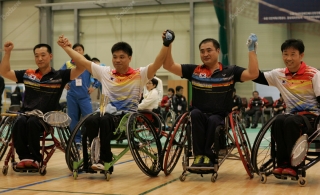
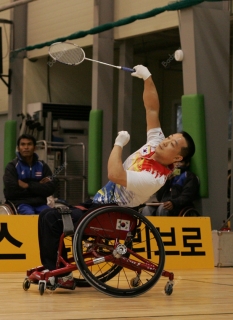
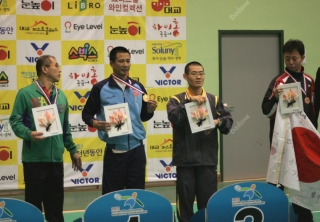
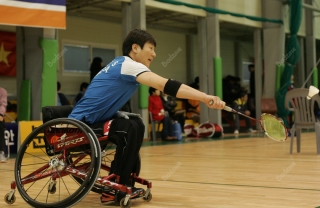
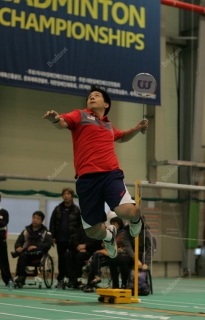

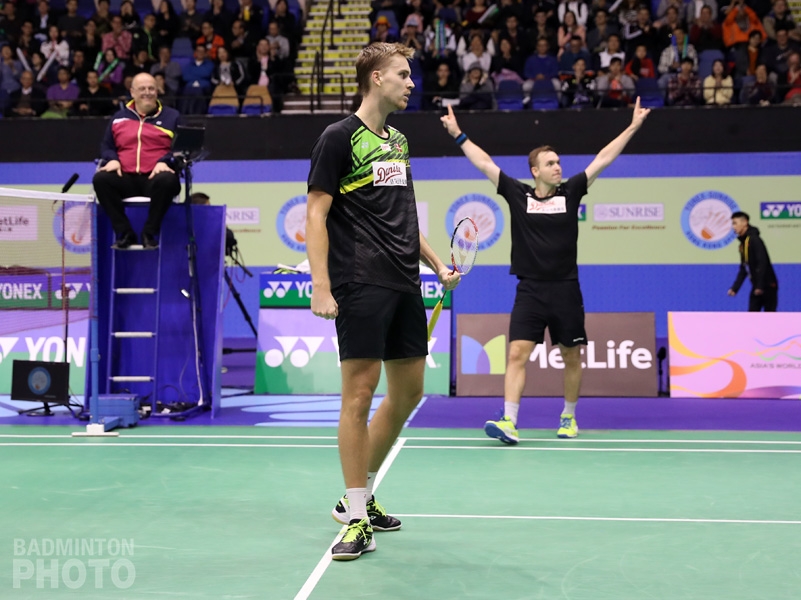
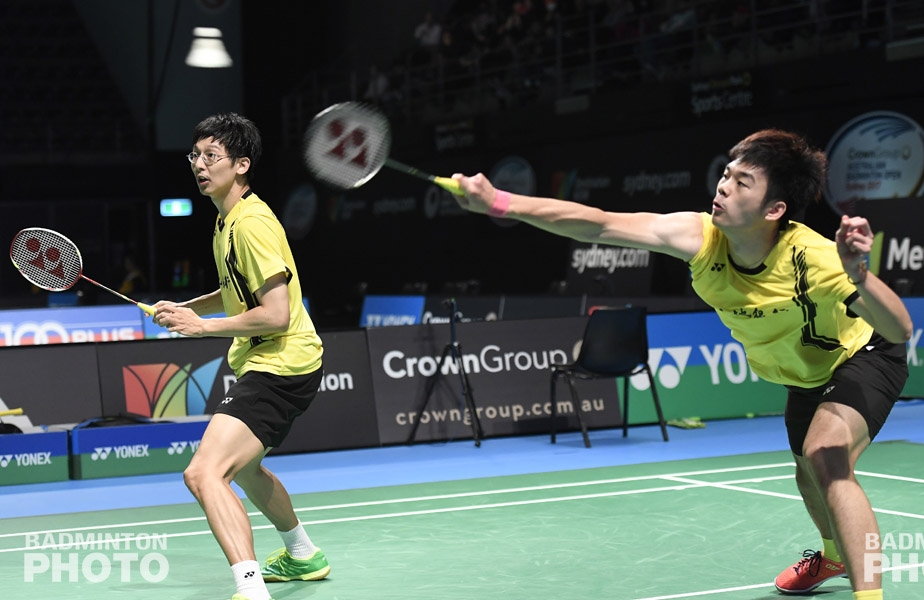
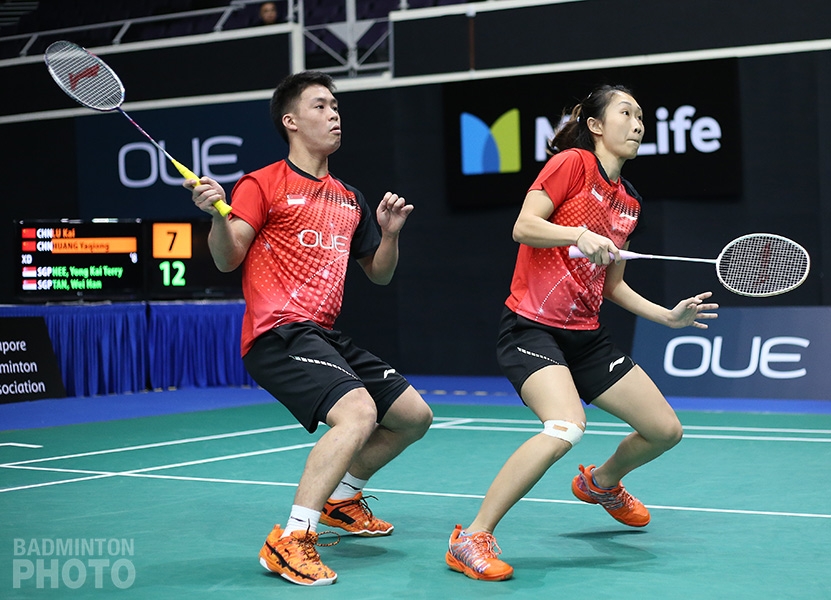
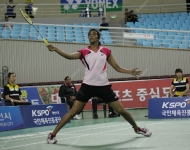
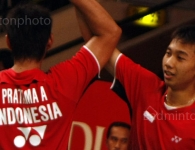
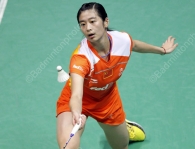
Leave a Reply